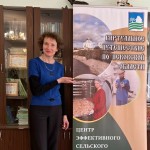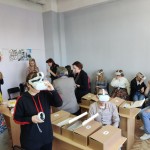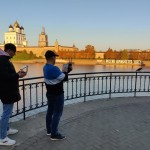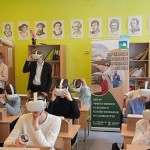Немногие знают о том, что законодательство Российской Федерации предусматривает право гражданина до 1 марта 2031 года на приобретение в собственность однократно бесплатно земельного участка в садоводческом товариществе. Данное право наступает с момента совершеннолетия. В нынешних реалиях актуальной темой является обеспечение продовольственной безопасности каждого гражданина. Наличие земельного участка может поспособствовать самообеспечению населения экологически чистыми продуктами питания, активному семейному отдыху, поддержанию здоровья, трудовому воспитанию детей и подростков, продлению жизни пожилых людей. Далее
Проекты
Презентация виртуальных путешествий по Псковской области
24 мая в Российской международной академии туризма состоялась презентация виртуальных путешествий по Псковской области 3Д формата в рамках социального проекта, реализуемого при поддержке Президентского фонда культурных инициатив.
Некоммерческий Центр эффективного сельского хозяйствования и садоводства продемонстрировал два итоговых видеофильма продолжительностью по 15 мин об известных псковских достопримечательностях.
На Псков с высоты птичьего полета с использованием специальных очков виртуальной реальности смогли посмотреть все присутствующие. Проект «Виртуальное путешествие по Псковской области» имеет большое образовательно-познавательное значение. Уже несколько недель фильмы производят фурор в псковских школах! «Инновационные уроки краеведения» – так называют их преподаватели.
На презентации присутствовали партнеры проекта, представители целевых групп, эксперты сферы туризма. Совсем скоро новинку увидит сообщество людей с особенностями развития. Улучшение доступности не менее 6 объектов культурного, духовного наследия и агротуризма Псковской области с акцентом на сельские территории – главная цель проекта. Получить представление о фильмах можно, посмотрев их на Интернет-ресурсах, - Анна Войченко, руководитель проекта, приглашает: «Результат проекта превзошел все наши ожидания.
Фильмы:
Ресурсный центр садоводов
На 2009 г. в Псковской области было официально зарегистрировано 520 садоводческих и огороднических некоммерческих товариществ, однако к 2021 г. их количество сократилось до 220. Но, несмотря на это, по закону «О ведении гражданами садоводства и огородничества …» даже в случае ликвидации юридического лица ведение садоводства или огородничества на садовых или огородных земельных участках может осуществляться гражданами и без создания товарищества. Далее
Виртуальное путешествие по Псковской области на YouTube
АНО «Центр эффективного сельского хозяйствования и садоводства» при поддежке Президентского фонда культурных инициатив в рамках социального проекта «Виртуальное путешествие по Псковской области» создал два видео-фильма в формате 3Д. Смотреть такие фильмы нужно в спец.очках виртуальной реальности. Однако представление о фильме можно получить, посмотрев его на YouTube-канале:
Фильм 1: Кремль, Псков, памятник «Ледовое побоище», церковь Богоявления с Запсковья, Органик-центр «Активное село»
Фильм 2: Изборская крепость, Свято-Успенский Псково-Печорский монастырь, Хлебный хутор
Перевод текстов фильмов на английский язык:
Pskov. The Kremlin
Russia begins here — this is what the people of Pskov say about their Motherland. Pskov, one of the most ancient and famous cities of medieval Russia, occupies a special place in Russian history. The Pskov land, being on the very border of cultures and civilizations, was enriched by the experience of different peoples but followed its own unique path. For centuries, it has carried the heavy burden of a border guard of Russian lands.
The Kremlin, the historical centre and the heart of the city, is located on a high limestone cape at the confluence of two rivers – the Velikaya and the Pskova. The Kremlin is also called “Krom”, which means a fenced space or a secluded place. This is where the development of the city began.
Holy Trinity Cathedral, the pearl of the Kremlin ensemble, is the perennial symbol of old Pskov. Its history began almost simultaneously with the history of the city itself. That’s why the Pskovites do not draw a distinction between their hometown and the Trinity Cathedral, calling Pskov the “House of the Holy Trinity”. The main element of the cathedral interior is a unique gilded 7-tier iconostasis preserved from the 17th century. It is richly carved and has a crucifix. Pilgrims flock to Pskov every day from far and wide to pay respect to the shrines of the cathedral. These are, first of all, the icons of the Mother of God and the relics of the Pskov saints.
It was at the walls of the cathedral that in ancient times the Pskov veche “seethed”: the supreme power in the city belonged to this popular assembly. Since ancient times, the cathedral has been the centerof public and state life. Today it is not only a functioning cathedral, but also a cultural monument of regional significance, preserved under state protection.
The Pskov fortress, one of the largest in Russia, dates back to the 15th-17th centuries. The local architects were considered the best masons. Inside Krom, the gates were protected by a narrow corridor «zahab» — from the Old Russian «sleeve». In these «corridors of death», defending their Motherland, the Pskovites destroyed the enemy by burning tar and stones. Western European chronicles call it a «smart fortress». Kilometer-long fortress walls have been preserved until our days. Stocks of food and weapons, the city treasury and the archives of the city used to be kept in Krom. Its territory was carefully guarded. “Whoever comes to us with a sword will die by the sword!” — so they say in the Pskov region.
The history of Pskov goes back to ancient times. In the 7th — 8th centuries, a tribe of Slovenes — Krivichs came here and a city arose, protected by rivers and steep slopes. According to one of the main versions, Pskov received its name from the Pskova River. Its name is translated from Finnish as «tar water». The first chronicle mention of Pskov dates back to 903. This date was associated with the local woman, Olga, whom the Kyiv prince Igor took as his wife. Princess Olga is the founder of the city, by whose order a cathedral was built in the name of the Holy Trinity.
Ancient Pskov is a city-fortress. Throughout its thousand-year history, Pskov served to protect the Russian land from the onslaught from the West. It became an insurmountable barrier for German, Lithuanian, Polish, Swedish and other conquerors who sought to seize Russian lands. With all its internal structure, geographical position at the crossroads of the most important routes, the very nature of its culture, Pskov resigned itself to this single goal: the defense of Russia from the West. Within the country there was no city that could equal Pskov in length and power of its defensive structures. Having captured Pskov during the Great Patriotic War, the Germans ruthlessly destroyed it. The restoration of the city — its ancient buildings and walls — continues to this day. The Pskov land was of great strategic and commercial importance, that’s why Moscow paid great attention to the strengthening its north-western borders.
Located on the northwestern border, Pskov has become a faithful keeper of Russian spirituality and culture. By Pskov monuments, as by milestones, one can trace the history of not only the Pskov land, but the whole Russia. Here the Holy Equal-to-the-Apostles Grand Princess Olga grew up, here she brought up the future Baptist of Russia, Prince Vladimir, here the military talent of Alexander Nevsky manifested itself. Pskov land gave the Orthodox world a long list of names of glorified saints. The idea of «Moscow — the Third Rome» was born here. The Pskov land is the birthplace of military leaders Mikhail Kutuzov and Konstantin Rokossovsky, composers Nikolai Rimsky-Korsakov and Modest Mussorgsky. It was on the Pskov land that the genius of Alexander Sergeevich Pushkin flourished!
Pskov Oblast has unique history and rich traditions. There are more than 5,000 cultural heritage sites, 10 active monasteries, ecological reserves and wildlife sanctuaries. Still, the tourism potential of the region is still being revealed. The region is located in the north-west of Russia. Its territory is about 55 thousand square kilometers. It borders on three states: Estonia, Latvia and Belarus. It is in Pskov that 10 of the 30 Russian monuments included in the UNESCO World Heritage List are located. The city itself seems to be smothered in the greenery of parks and squares, modestly preserving its precious pearls, framed in a quiet provincial life.
A journey across the Pskov land is an amazing excursion in time. The administrative centerof the region, the city of Pskov, is a real tourist Mecca today. Here you can admire the stunning monuments of history, culture, architecture and archeology of our country.
By getting acquainted with the Pskov land, you will be filled with the depth of faith, you will drink life-giving springs, plunge into the atmosphere of the Middle Ages of ancient cities, discover little Switzerland, become connoisseurs of ancient Russian art, skilled merchants and artisans. You will be surrounded by the atmosphere of vast land and lake expanses.
Since 2009, Pskov has been awarded the honorary title «City of Military Glory». Here you can literally touch history with your own hands. The city keeps the memory of how the troops of Alexander Nevsky, together with the people of Pskov, defeated the German knights on the ice of Lake Peipus. The heroic defense of Pskov forced King Stefan Batory to make peace in the protracted Livonian war and return the captured cities. These walls withstood the siege of the troops of the Swedish king Gustaf Adolf. During the Great Patriotic War, the brave and valiant people of Pskov, remembering their duty to their ancestors, launched a partisan movement and created a famous partisan land.
Russia will never forget the feat of the 6th company, when the Pskov paratroopers showed the best qualities of a Russian soldier — valour, endurance and professionalism.
Pskov is a city that keeps the secrets of history, the colossal heritage of Russia, ready to share with you all its accumulated wealth and modern hospitality.
Church of Theophany from Zapskovye
There are 44 active churches in the city of Pskov. Among the unique ones is the Church of Theophany from Zapskovye. This church is one of the most famous architectural monuments belonging to the heyday of Pskov architecture in the 15th-16th centuries. The church is spectacularly located on the high bank of the Pskova River.
The church is an example of the highest degree of pure and beautiful religious art. It combines the best traditions of the Pskov school of architecture, its inherent simplicity of appearance with the complexity of composition and non-standard, picturesque architectural solutions. The church itself is arranged symmetrically, but the belfry is placed in such a way that the overall composition becomes asymmetrical. The belfry protruding forward with a powerful base gives the whole church a new, large scale. In this construction, artistic expressiveness is achieved by extremely simple and concise means.
The famous Pskov architect-restorer Yuri Spegalsky considered this church one of the «artistically most outstanding buildings of ancient Pskov.»
The monument, as a brilliant example of the Pskov school of architecture, is included in the list of UNESCO World Heritage Sites.
Monument to Alexander Nevsky
One of the most significant monuments of the Pskov region is located just a few kilometers north of the city. You can easily get here by car.
This huge, a 30-meter-high sculptural composition weighs 163 tons and is made of copper and bronze. It depicts Grand Prince Alexander Nevsky, sitting on a horse, surrounded by warriors from Pskov, Novgorod, Suzdal and Vladimir.
The monument to The Battle on the Ice personifies the unity and valour of Russian people in the fight against the enemy, the unity and indivisibility of the Russian land, its conciliarism, in which our ancestors found spiritual strength and support.
For the Russians, the battle in 1242 is of great importance: if Alexander Nevsky had not won a victory over the German knights, there would have been no Russian state.
From the time of the Grand Prince to the present day, the people of Pskov show examples of courage, unbreakable spirit and self-sacrifice in the name of the Motherland.
The author of the monument is the sculptor Iosif Kozlovsky. The architect Petr Butenko chose a perfect place for the monument — Mount Sokolikha. It offers a panoramic view of Pskov. The majestic monument is turned to the north-west towards the place of the Battle on the Ice. Menacingly, the warriors look to the west, where the waves of the Pskov-Chudskoye Lake lap. The Russian Land has been holding on such people and will continue to be!
Organic-center “Active Village”
It is a pleasure to complete the amazing journey across the Pskov region with a delicious visit to an agricultural enterprise, to get acquainted with the Pskov cuisine and gastronomic traditions of the region!
As we eat ourselves or feed our children, more and more often we think about how this or that product is produced, what it contains. Not all enterprises are ready to show their production processes. And the Pskov Organic Center «Active Village» believes that the product must be honest. Pskov snacks and Pskov tea are prepared from local natural raw materials. Anyone can be convinced of their benefits by looking at the production processes of the center with their own eyes.
This is a unique place in Russia where they provide a paid social service at cost price — to farmers, villagers, gardeners. They dry there agricultural products, including wild plants: vegetables, fruits, greens, herbs, berries, mushrooms. The center was built taking into account the experience of Estonia under the Russia-Estonia cross-border cooperation program — for the development of the Pskov village!
During the tour visitors can see how agricultural products are washed, cleaned, cut, dried and packaged. They begin to understand how the production of organic (eco) products differs from other types of production.
For example, the center does sanitary cleaning of the premises not with bleach, but with alcohol-containing products. The employees’ uniform does not have pockets and buttons in accordance with the international food safety management system.
The center is equipped with modern, innovative equipment. It dries farm and horticultural products carefully, at low temperatures, including freeze-drying.
A visit to such a production is interesting for both adults and children, as well as teenagers choosing a career path. The tours are always accompanied by tastings of new products, for example, willow-herb tea with Icelandic moss, a natural antibiotic that boosts immunity and restores after a serious illness.
Guests can’t always guess what is there on the plates. Radish slices look like rose petals, and dried onions are sweet for some reason. Crispy apple slices of various types and Ivan tea (willow-herb) are original products of the Pskov land. Workshops on Pskov cuisine and Pskov tea surprise with unexpected fragrant solutions. Here you can collect your own tea and take it with you! The farm products shop “Everything from Pskov” please visitors with local delicacies.
Therefore, when traveling around the Pskov region, be sure to visit the Active Village Organic Center!
Time flies in Pskov. The regularity of the local life makes you forget about the daily hustle and bustle. A person who once visited Pskov will definitely return here or will dream of seeing this ancient city again.
Pskov Oblast is the land of ancient history and unique culture. This is the most picturesque area of forest lakes and clean air. Here you can find an abundance of amazingly charming places of pristine nature. This land is called the Land of a Thousand Lakes.
Thousands upon thousands of tourists and pilgrims come to the region ever year. They wish to touch the local shrines and see the ancient Orthodox monasteries and cathedrals, as well as amazing objects of ecotourism.
The region was included in the list of the Silver Ring of Russia primarily due to the amazing monuments located on its territory.
Izborsk
30 km away from Pskov, on the way to Riga, you can find one of the pearls of the Pskov land — the city-fortress Izborsk. It was first mentioned in the Tale of Bygone Years in 862. There and then the history of the first ruling dynasty in Russia, the Rurikids, began. One of the legendary Varangians — Truvor — settled down to reign in Izborsk.
In the 14th century, the Izborsk fortress became a powerful western outpost of the Russian lands. The main strategic task of Izborsk was to hold back the constant onslaught of the German knights of the Livonian Order.
Inside the fortress, Izborsk people built a church in honor of St. Nicholas the Wonderworker. He is the patron saint of warriors, sailors and travelers.
The fortress withstood 8 major sieges in the 14th-15th centuries. Izborsk inhabitants repeatedly saw how the treacherous Livonians were forced to lift the siege of the city and go home in disgrace.
Today Izborsk is an open-air museum, a small island of Ancient Rus. It can make one an artist, infinitely devoted to the traditional beauty of one’s native land. Izborsk reveals the real history by letting you touch its ancient walls. No wonder Nicholas Roerich found himself here as an artist.
The Izborsko-Malskaya Valley has the status of a Natural Landscape Museum-Reserve. It has a special climate. Perhaps this explains the diversity of the flora and fauna of the valley. Relic, state-protected plants grow here. Also, in the valley you can see an unforgettable relief formed as a result of the Valdai glaciation, which occurred 10 thousand years ago.
According to one version, the name of the settlement is associated with the Slavic word «izvor» — «spring», «source».
Slovenian springs are an amazing natural and historical monument, which has rightly become one of the most original and romantic landmarks of the Pskov land.
The springs join into a single «River of Life» and flow like a waterfall into the picturesque Gorodishchenskoye Lake, where swans live all year round. Spring water temperature is +5C° in summer and +3°C in winter. Underwater ice springs have been there for more than a thousand years. The natural feature of the springs is that they do not freeze even in the most severe frosts. Live water, essentially making up the soul of this earth, is the eternal singing of streams.
People believe that the springs are miraculous: each spring can bestow those drinking from it with Health, Wisdom, Love, Wealth, Youth, Beauty, and Strength. But not a single person knows which spring carries what merit – the Providence should tell you which spring you need to approach. Every year on Friday of Easter Week, on the day the icon of the Mother of God «The Living Spring» is commemorated, the springs are consecrated by the Orthodox Church.
Izborsk is a hospitable and marvellous place where you can relax and unwind. The beauty of these places fascinates travelers. Perhaps that is why they are often called Pskov Switzerland.
Pechory
The spiritual treasury of Russia — the Holy Dormition Pskov — Caves Monastery lies 50 km west of Pskov. Located at the very Estonian border, it is considered one of the most revered monasteries in Russia.
The monastery has carried the light of the Orthodox faith through the centuries: its history goes back 500 years. Here the service of the Divine Liturgy and the monastic life have not been interrupted since its inception.
Here, on the North-Western frontier of the country, on the ancient Pskov land, the seeds of the Orthodox faith sprouted, which were sown in Russia back in the 10th century by Princess Olga.
The miraculous relics kept in the monastery, the spiritual exploits of the great startsy (elders) who lived in different periods of the history of the monastery attract every year a huge number of guests and pilgrims from all over the country. You can get to the monastery both by car and by coach.
The first monks settled in these places at the end of the 14th century; they lived in caves covered with trees. Their elder was Venerable Monk Mark, whose relics are still buried in the monastery. A resident of Izborsk, cutting wood nearby, discovered the entrance to the caves and the inscription above them: «God-created cave.»
In the 15th century, missionary priest Ioann from Moscow came to these places with his wife Maria. They dug out a cave church in honour of the Dormition of the Most Holy Theotokos (Our Lady) and at the end of their lives they were tonsured monks with the names of Iona and Vassa. Thus, the monastery was founded in 1473 by a married couple — husband and wife. The city that arose later was called Pechory, which literally means «caves».
In the 16th century, under hegumen Korniliy, a powerful stone fortress was erected around the monastery. The Venerable Monk Korniliy increased the number of brethren from 15 to 200 people and baptized the local people «Seto». With his blessing, a well was dug in the monastery square, which still exists today. The water of the holy well has healing properties. It helps in physical and mental ailments.
Despite the merits of the hegumen, his life was cut short tragically. On a false accusation of treason, Tsar Ivan the Terrible executed Monk Korneliy. His body was taken to the Assumption Church along the road which has since been called the “Bloody Way”.
During the course of its history, the monastery was often attacked from the west. The fortress, with the feat of prayer of the monastic brethren and intercession of the Most Pure Mother of God, helped the monastery to withstand many battles, including the siege of the army of the Polish king Stefan Batory, the Swedish kings Carl Gustav and Carl XII. The cathedrals and caves of the monastery continued to keep their shrines.
Peter I was here four times: he erected bastions to protect the monastery. The carriage belonging to Empress Anna Ioannovna reminds of her visit to the monastery. Alexander I came here for spiritual advice to Monk Lazarus the Perspicacious. Nicholas II was here on a pilgrimage.
When in the Pskov-Pechersky monastery, many pilgrims wish to visit the caves created by God. They are a necropolis — a place of more than 10 thousand burials: elders, monks, pious laymen and pilgrims, warriors who defended the walls of the monastery, representatives of ancient noble families: the Pushkins, Kutuzovs, Suvorovs, Mussorgskys. A miraculous phenomenon is observed in the caves: the bodies of people buried here do not emit the smell of decay.
In the first half of the 20th century, one of the most prominent saints of the monastery was Venerable Monk Simeon Zhelnin. He lived in a cave cell, exercised the feat of prayer as a schemer, possessed the gift of clairvoyance, cast out demons and left behind many spiritual instructions. His relics rest in the Sretensky church of the monastery. In 1967, Ioann Krestyankin, one of the most famous elders of the 20th century, came to the monastery. Every day he received a huge number of people from all over the country and spiritually led the brethren of the monastery.
Behind the facade of the main church of the monastery, the Assumption of the Most Holy Theotokos, behind its domes, there is the Holy Mountain. This is the place where Monk Mark once prayed on a large stone. At the top of this mountain is a fruit-bearing garden as a memory of the Garden of Eden. At the roof of the Assumption Church, the Old Oak, which is over 600 years old, has been preserved. It is a silent witness to the history of the Pskov-Caves Monastery. The Old Oak is one of the five oldest trees in Russia. Not far from it, a log church was erected in honor of the Cathedral of the Pskov-Caves Saints.
Several miraculous icons are kept in the churches of the monastery. The most revered are the icon of the Assumption of the Mother of God, the Pskov-Pechersky icon of the Mother of God «Tenderness» and the icon of the Mother of God «Hodegetria». Every year on August 28, a religious procession takes place around the monastery with the miraculous icon of the Assumption of the Mother of God, in which thousands of people from all over Russia take part.
To this day, the Holy Dormition Pskov — Caves Monastery continues to help many monks and laity find their way to God. An inexhaustible stream of pilgrims come to the monastery, where they find spiritual comfort and support, talk with the disciples of the elders about their path to salvation, partake of divine grace in worship and in prayers before holy icons and relics, drawing strength and inspiration for a further pious life in the world.
Leaving the Pskov-Caves Monastery, we bid farewell with the words of Father Ioann Krestyankin: «Rejoice, Holy Monastery, at all times, for you serve us with unfading Joy.»
Bread Farm
Hospitality is in the blood of Pskovites. Russian cuisine with Pskov gruel, herbal tea and gingerbread is waiting for you on the way from the monastery to Pskov at the Bread Farm!
This is an eco-village with a Russian soul, vast expanses and a delicious farmer’s meal! This authentic Russian village is a cozy and hospitable place.
Here you will be treated with a delicious lunch made from natural products. You will be pampered with healthy Pskov sweets: airy marshmallows with cranberries, handmade poppy-seed sweets. You can take part in a workshop on making a unique patented printed gingerbread!
There are more than 70 wooden boards for gingerbread on Bread Farm. There is, for example, the one-pood «Royal Tray», which means it weighs 16 kg.
Here they like to ply guests with dishes which preserve the character and traditions of Russian hospitality. On holidays and on summer Sunday evenings, guests from far and wide are invited. There are feasts, concerts and village festivities.
Far from the hustle and bustle of the city, you will enjoy workshops in native Russian crafts. They are pottery, bread baking, cheese making, traditional Russian weaving and sewing.
You will be able to go horse-riding and enjoy communication with animals.
In the summer, the Farm holds a craft camp for children. Young people attend pottery and weaving workshops, folklore studios, classes in painting and baking, go on hikes. In the refectory, they treat themselves to natural products: dishes from homemade milk and poultry, and, of course, Pskov gruels. Simple and very wise local food.
Craftsmen from other regions of Russia come to Bread Farm to exchange experience. There is a Guest House and a modern Chicken Coop, as well as a shop where you can buy local produce.
Bread Farm is amazing: the hospitable hostess Olga and the fabulous interior will be remembered for a long time. We invite you to plunge into the old days and spend a day in an amazing Russian village!
Виртуальное путешествие по Псковской области. Тест VR-шлемов
Состоялась презентация «Виртуального путешествия по Псковской области»

В Центре туризма и творческих индустрий Пскова прошла презентация социального проекта «Виртуальное путешествие по Псковской области», реализуемого при поддержке Президентского фонда культурных инициатив. Об этом Псковскому агентству информации сообщили организаторы мероприятия.
Участниками стали представители администраций Пскова и области, Торгово-промышленной палаты, Инновационного центра Сколково, эксперты в сферах культуры и туризма, специалисты информационно-туристического центра.

Оператор проекта «Центр эффективного сельского хозяйствования и садоводства» продемонстрировал первый видеофильм о Пскове и о его главной достопримечательности – Кремле. Эффект полного погружения позволили создать специальные очки виртуальной реальности – VR-шлемы.
Цель проекта — улучшение доступности не менее 6 объектов культурного, духовного наследия и агротуризма Псковской области с акцентом на сельских территориях в образовательно-познавательном аспекте и аспекте развития туризма.

«Значение виртуальных туров: во-первых, знакомство с красивыми местами, географией и историей местности, во-вторых, помощь с выбором места для отдыха, в-третьих, формирование экологической культуры при посещении туристических мест, в-четвертых, готовый инструмент для проведения уроков географии в новом увлекательном формате, в-пятых, демонстрация туристической инфраструктуры для отдыха, в-шестых, путешествия и изучение географии, истории в периоды, когда есть ограничения», — отметила руководитель проекта Анна Войченко.

По её словам, виртуальность даёт возможность посетить место в любое время, а также экономическую независимость, когда есть ограничения во времени, в финансах, социальный статус, возможности человека (малый возраст, ограничения здоровья, военнослужащие и т. п.). «Виртуальный мир создаёт комфорт через доступность для путешествия без ограничений, экономию времени, физическую безопасность, удобство, интеллектуальное развитие. Это актуально для школьников и людей с ограниченными возможностями здоровья – участников проекта», — добавила Анна Войченко.
Напоминаем, бесплатные виртуальные мероприятия со школьниками и людьми с особенностями развития пройдут в марте-апреле 2022 года.
Обучающие семинары 2020
ВНИМАНИЕ!!!
В связи с Указом Губернатора № 191-УГ от 30.10.2020 года обучающие семинары для председателей садоводческих товариществ 12 и 17 ноября 2020 в очной форме ОТМЕНЯЮТСЯ.
ПРОО «Комиссия по садоводствам» в рамках грант-проекта «Повышение уровня взаимодействия органов власти с садоводческими товариществами как залог успешного развития крупнейшего сектора некоммерческой самозанятости населения региона» при поддержке Фонда президентских грантов в октябре-ноябре 2020 года проводит следующие мероприятия: Далее
Семинары для активистов СНТ 31.10.19
31 октября 2019 г. в Пскове прошло два семинара с активистами, членами правлений СНТ г. Пскова, Псковского и Печорского районов – первые из Курса правовой и управленческой грамотности по проекту «Повышение уровня взаимодействия органов власти с садоводческими товариществами как залог успешного развития крупнейшего сектора некоммерческой самозанятости населения региона». Проект осуществляется с использованием гранта Президента Российской Федерации, предоставленного Фондом президентских грантов. Далее
Анонс семинаров 31.10.2019
31 октября 2019 года в 16.00
В рамках Грант-Проекта «Повышение уровня взаимодействия органов власти с садоводческими товариществами как залог успешного развития крупнейшего сектора некоммерческой самозанятости населения региона», реализуемого с использованием гранта Президента Российской Федерации, предоставленного Фондом президентских грантов, начинается курс правовых и управленческих семинаров. Далее
Упрощенный порядок оформления объектов недвижимости в СНТ
09 октября 2019 года состоялась встреча специалистов Кадастровой палаты Псковской области с представителями садоводческих товариществ. Участники встречи были проинформированы о продлении сроков действия упрощенного порядка оформления садовых и жилых домов, расположенных на земельных участках, предназначенных для ведения гражданами садоводства, — до 1 марта 2021 года, а также оформлении земельных участков в собственность, предназначенных для ведения гражданами садоводства, — до 1 марта 2022 года. Далее
Активисты СНТ и органы власти
Активисты самого крупного некоммерческого сектора самозанятости населения научатся делать более качественно социальные заказы органам власти. Далее









 +7 900 999 77 00
+7 900 999 77 00







